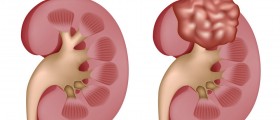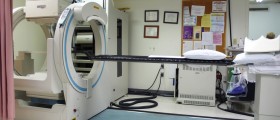
Kidney cancer is a malignant tumor originating from the cells that form kidney. In older people, the most common type of kidney cancer is renal cell carcinoma. Apart from renal cell carcinoma there are additional but not so frequent types of kidney carcinoma including transitional cell carcinoma and Wilms' tumor. Transitional cell carcinoma originates from transitional epithelium which is located at the crossing of kidney epithelium and epithelium of ureters. Wilms' tumor most commonly affects children and it is also known as neuroblastoma.
Treatment Modalities for Kidney Cancer
The treatment of kidney cancer basically depends on numerous factors including the stage of the disease, general health of the patient and pathohystological type of the tumor. The treatment modality is specific and different from the regular if the cancer has spread to surrounding tissues or distant organs. Surgery for Kidney Cancer
Surgery is the first treatment modality for this cancer. The surgeon may perform nephrectomy, which is the removal of the entire kidney, or nephron-sparing surgery, in which only the tumor is resected. In radical nephrectomy apart from resection of the affected kidney a patient also undergoes resection of the surrounding tissue and regional lymph nodes. In radical nephrectomy even adrenal gland is resected if affected by the tumor. It is suitable if the tumor is small and is done if patient only has one kidney. In nephron sparing surgery the healthy tissue of the affected kidney is spared. Both surgeries can be performed as open or laparoscopic.
Additional Treatment Modalities
In case that surgery is not possible there are several options available. The first one includes embolisation of the tumor. This procedure includes injection of a specific material into the leading blood vessel of the kidney. Artificial clogging of the vessel results in restriction of oxygen supply of the tumor. The tumor also does not receive sufficient amount of nutrients, therefore it cannot grow.
Cryoablation is another option. This procedure includes insertion of the needle into the tumor. Insertion is performed with the assistance of X-ray. After the needle has reached the tumor the doctor injects special gas which will froze the tumor cells.
Radiofrequency ablation is a procedure which is preformed exactly like cryoablation. However, instead of gas the tumor is treated with electrical currency which runs down the inserted needle. This way the tumor cells are heated and burnt.
Treatment for Advanced and Recurrent Kidney Cancers
In advanced stages and recurrence of the disease a surgeon can perform the operation and remove as much of the tumor as possible. Further therapy includes immunotherapy (biological) therapy and it consists of specific medications such as interleukin-2.
Apart from immunotherapy patients can also undergo targeted therapy. Targeted therapy includes medications which block signals that induce the growth of blood vessels in the tumor and better supply of the tumor with oxygen and nutrients. Some of the medications used in targeted therapy include bavacizumab, pazopanib and so on.
And finally, chemotherapy is given to patients to reduce the size of the tumor or it is applied in metastatic phase of the disease.
Metastases can be treated surgically and in some cases with radiation therapy.

















Your thoughts on this
Loading...